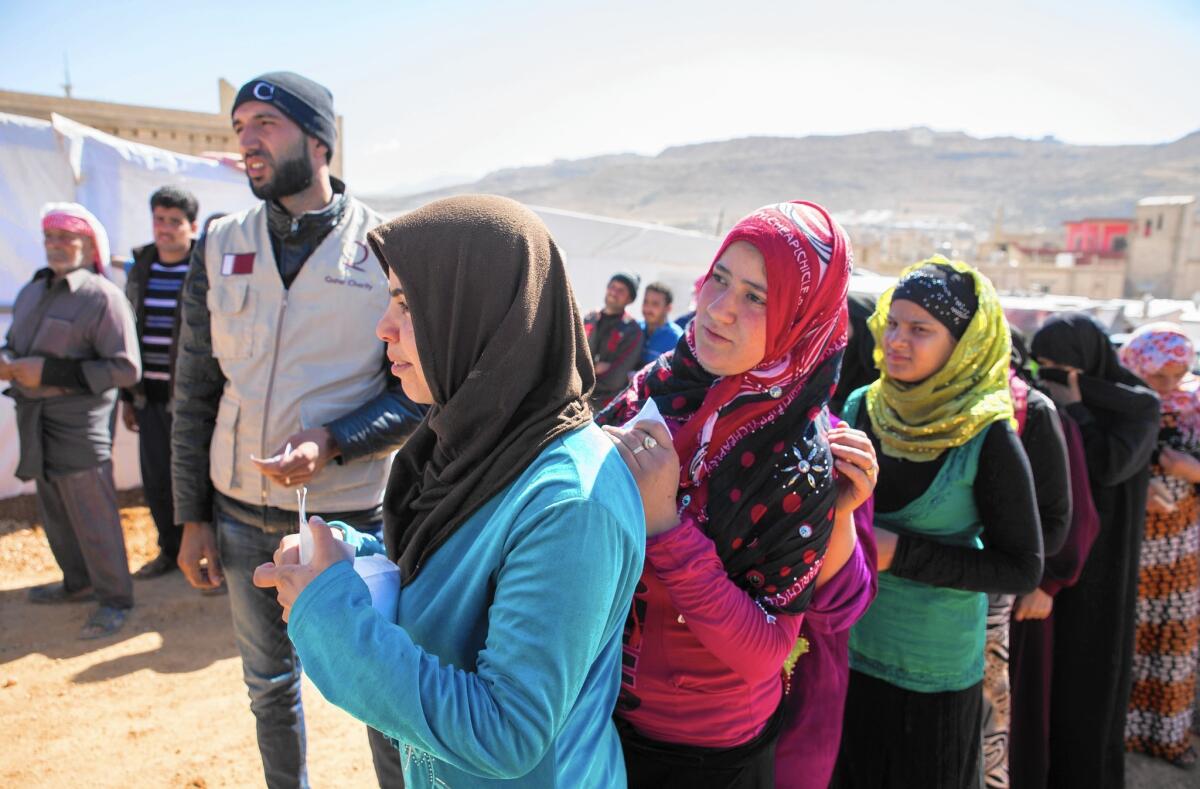U.S. to accept Syrian refugees in greater numbers after slow start

- Share via
Reporting from Washington — The U.S. government intends to dramatically accelerate efforts to resettle refugees from the Syrian civil war and is preparing for a “surge” of thousands in each of the next few years, State Department officials announced this week.
They have some catching up to do: The United States has so far accepted only 300 of the more than 3.2 million refugees who have fled Syria since the war began almost four years ago.
The United States is the world leader in refugee resettlement, accepting 70,000 displaced people a year, more than all other countries combined. It’s poured $3 billion into supporting the Syrian refugees who have spilled into camps and cities in Jordan, Lebanon, Turkey and other neighboring countries.
But the U.S. has come under criticism from aid groups for its pace in taking in refugees from the Syrian war, which is by far the largest refugee crisis of recent years.
“They’ve been incredibly slow,” said Stacie Blake, director of government relations for the U.S. Committee for Refugees and Immigrants. “We’re years into the crisis, and it’s not about to stop. We do see other countries around the world who have been able to step up.”
U.S. officials say the resettlement program has moved slowly because the United Nations refugee agency, which they look to for referrals, didn’t begin making recommendations until late last year. And the United States takes 18 to 24 months on average to carefully vet each applicant to make sure he or she poses no security risk.
Refugees are brought in with the goal of making them U.S. citizens. The largest concentrations of resettled refugees are in California, Illinois and Texas, according to the State Department.
The State Department will resettle only the small minority who are in the most dire need, including the very young, ailing and elderly, and people who have been persecuted by their government. Even so, applicants have to be screened by counter-terrorism agencies, the Pentagon and the Department of Homeland Security in a process that is more selective than what is used for anyone else who wants to enter the United States.
The screening has become more rigorous since 2009, when authorities were alarmed to discover that two members of Al Qaeda had entered the country posing as Iraqi refugees. That concern has been sharpened by worries that fighters from the Islamic State militant group may try to enter the United States, refugee advocates said.
On Tuesday, Anne C. Richard, assistant secretary of State for population, refugees and migration, said at a U.N. meeting in Geneva that the Obama administration was going to step up its efforts because the refugee outflow had swelled “to a mass exodus.”
She said that the department is considering 9,000 resettlement applications and that “we expect admissions from Syria to surge in 2015 and beyond.”
The U.S. move comes at a time when few countries have been responding to the growing need. Although some, such as Germany, Sweden and Austria, have been generous in taking in refugees, many others have resisted.
The Persian Gulf countries, the richest Arab bloc, have refused to take in any Syrians. So have Russia and China.
At the Geneva meeting, 28 countries agreed to take in 66,000 refugees. But that was far short of the 300,000 Syrians that officials at the U.N. refugee agency believe need to be resettled.
Congress has been ambivalent about resettlement. Some lawmakers have pushed for a quicker process, Blake said. Others have urged officials to take their time because of security concerns, she said.
Advocates acknowledge that security is a legitimate worry. But some contend U.S. officials could streamline the process by easing paperwork requirements.
For people who have fled their homes during raging battles, “it can be an undue burden to make them document their lives,” said Sunjeev Bery, Middle East advocacy director for Amnesty International USA.
Twitter: @richtpau
More to Read
Sign up for Essential California
The most important California stories and recommendations in your inbox every morning.
You may occasionally receive promotional content from the Los Angeles Times.












